Are you considering upgrading your outdoor space but unsure whether to choose resin patio or paving?
We will explore the key differences between the two options, including the materials used, installation processes, durability, maintenance requirements, and costs.
We will also delve into which option is ultimately cheaper, considering both the initial and long-term expenses.
Other important factors to consider when making your decision include aesthetics, climate suitability, functionality, and environmental impact.
Stay tuned to make an informed choice for your outdoor space!

What Is A Resin Patio?
A resin patio is a modern and stylish outdoor surface solution made from a mixture of resin and aggregate materials. It offers a durable and visually appealing finish that can enhance the aesthetic of any outdoor space.
Resin patios are versatile and can be customized to match various design preferences, whether you prefer a sleek, contemporary look or a more natural stone-like appearance. The installation process involves pouring the resin mixture onto a prepared base and allowing it to cure, creating a seamless and sturdy surface.
One of the key benefits is the low maintenance required for resin patios; a simple occasional wash with water is usually sufficient to keep them looking fresh. Resin patios are known for their durability, with the ability to withstand heavy foot traffic and various weather conditions.
Explore: How Long Do Resin Patios Last
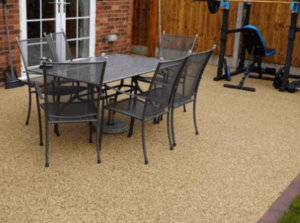
What Is Paving?
Paving involves the use of materials such as concrete, stone, or bricks to create a hard surface for paths, driveways, or outdoor areas. Block paving, a popular paving method, utilizes interlocking blocks to form a sturdy and visually appealing surface.
Concrete paving is known for its durability and low maintenance, making it ideal for high-traffic areas such as driveways and sidewalks.
Stone paving, on the other hand, offers a more natural and rustic look, perfect for garden paths and patio areas, adding a touch of elegance to outdoor spaces.
Brick pavers provide a timeless charm and are versatile enough to suit both modern and traditional design preferences, giving homeowners a wide range of options to enhance their outdoor aesthetics.
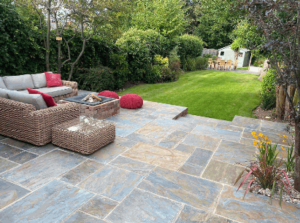
What Are The Differences Between Resin Patio And Paving?
The distinctions between resin patios and traditional paving methods like block paving lie in their material composition, installation process, durability, maintenance needs, and overall cost-effectiveness.
Resin patios, for instance, are known for their flexibility and durability due to the unique nature of resin material. They offer a seamless, smooth surface that can be customized in various colors and designs, providing a contemporary and sleek aesthetic appeal.
On the other hand, block paving solutions offer a more traditional and structured look, with a range of patterns and textures to choose from, adding a classic touch to outdoor spaces.
Material
The material used in resin patios primarily consists of a blend of resin and aggregates, offering a seamless and visually striking finish.
In comparison, block paving relies on interlocking concrete or clay blocks to form a robust surface with a classic look. Resin patios are known for their flexibility, allowing for various design possibilities and color options to suit individual preferences. On the other hand, block paving offers a more traditional appeal and can be arranged in intricate patterns or simple designs, adding character to outdoor spaces.
Installation Process
The installation process of resin patios typically involves mixing the resin and aggregates on-site before applying the mixture to a prepared surface. On the other hand, block paving requires meticulous placement of interlocking blocks by skilled installers to ensure a stable and uniform surface.
For resin patios, the first step involves preparing the area by ensuring it is clean and free of debris. Next, the resin and aggregates are mixed in the right proportions to achieve the desired finish. Professional installers carefully pour and spread the mixture onto the prepared surface, ensuring it is level and uniform.
On the other hand, with block paving, the skilled installers meticulously lay each interlocking block, paying attention to the pattern and alignment. Proper surface preparation is crucial here as well, requiring a well-compact base and precise placement of each block.
Durability
Resin patios are known for their durability and resilience to weathering, cracking, or fading over time. In comparison, block paving surfaces may require occasional repairs or maintenance to address issues such as loose blocks or weed growth.
Resin patios offer a long-lasting solution for outdoor spaces, as they are highly resistant to wear and tear caused by heavy foot traffic or harsh weather conditions. Their smooth surface also makes them easier to clean compared to block paving, which can accumulate dirt and debris in between the blocks.
Regarding maintaining these surfaces, regular sweeping and occasional power washing can help prevent dirt buildup and maintain their aesthetic appeal. With proper care, resin patios can retain their vibrant color and smooth finish without the need for frequent resurfacing or repairs, unlike block paving surfaces that may require more frequent attention.
Maintenance
Resin patios typically require minimal maintenance, with occasional cleaning and resealing to preserve their appearance and integrity. Contrarily, block paving surfaces may need regular maintenance, such as weed removal, re-sanding, and re-sealing to prevent deterioration.
For resin patios, a gentle cleaning with a mild detergent and water is usually sufficient to keep them looking fresh. Periodic resealing is recommended to protect the surface from UV rays and stains, ensuring longevity.
On the other hand, block paving surfaces demand more attention, with frequent weed removal to prevent growth between the cracks that can undermine the structure.
Re-sanding is crucial for maintaining the stability and evenness of block paving, especially in high-traffic areas where the sand may erode over time. Applying a quality sealant helps to safeguard against oil spills, fading, and erosion, prolonging the lifespan of the driveway surface.
Cost
When comparing the cost of resin patios and block paving, factors such as initial installation expenses, long-term maintenance costs, and the overall lifespan of the surface should be considered to determine the most cost-effective option for driveway or outdoor areas.
Resin patios typically have a higher initial installation cost than block paving due to the materials and specialized expertise required. Over time, resin patios often prove to be more cost-effective as they require minimal maintenance compared to block paving which may need regular re-sanding and sealing. This makes resin patios a durable and long-lasting solution that can add value to your property.
On the other hand, while block paving may have a lower upfront cost, the ongoing maintenance expenses should be factored in when evaluating the overall cost of the surface solution. It is crucial to weigh the upfront investment against the long-term benefits and durability of each option to make an informed decision.
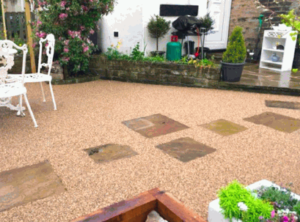
Which One Is Cheaper: Resin Patio Or Paving?
Determining whether a resin patio or traditional paving like block paving is cheaper depends on various factors, including the initial installation cost, ongoing maintenance expenses, and the expected lifespan of the surface.
Resin patios offer a unique solution that combines aesthetics with durability. While the upfront cost of resin installation can be higher than traditional paving methods, the long-term savings may outweigh this initial investment.
- Resin surfaces require minimal maintenance compared to block paving, reducing the overall expenses over the years.
- The longevity of resin driveways means that they often outlast traditional options, making them a cost-effective choice in the long run.
Initial Cost
The initial cost of installing a resin patio can vary based on the size of the area, the complexity of the design, and the choice of resin materials. Similarly, block paving projects involve expenses related to the type of blocks used, labor costs, and surface preparation requirements.
When considering material selection, resin patios offer a range of options from more affordable basic resins to premium, high-end choices. Block paving projects also present a variety of block types, with concrete being a cost-effective selection and natural stone offering a luxurious finish.
Moreover, labor expenses play a significant role in the total cost. Skilled professionals ensure proper installation, but their expertise comes at a price. Opting for reputable contractors may increase upfront costs but can prevent future repairs or replacements.
Furthermore, additional requirements like base preparation and edging materials are essential for driveway durability. Balancing quality and cost efficiency involves assessing these supplementary needs to avoid future expenses.
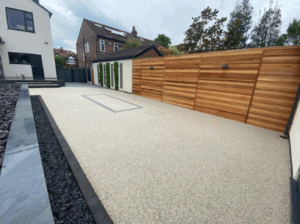
Long-term Cost
Assessing the long-term cost implications of resin patios versus block paving involves considering factors such as maintenance needs, repair requirements, and the lifespan of the surface finish to determine the overall cost-efficiency of each driveway solution.
Regarding resin patios, the ongoing expenses mainly revolve around periodic cleaning to maintain the surface’s aesthetics. Proper cleaning techniques such as using mild soap and water can help prevent dirt buildup and preserve the patios’ appearance.
On the other hand, block paving requires occasional repairs to fix sunken or damaged blocks, which can add to the overall maintenance cost. The application of protective solutions like sealants can enhance the durability of both resin patios and block paving, reducing the frequency of repairs and prolonging the lifespan of the surfaces.
What Are The Other Factors To Consider When Choosing Between Resin Patio And Paving?
Along with cost and durability, factors such as aesthetics, climate suitability, functional requirements, and environmental impact should be taken into account when deciding between a resin patio and traditional paving solutions.
When considering resin patios, one must acknowledge their versatility in terms of design. Resin allows for a wide range of customization options, including various colors and patterns, giving homeowners the freedom to create a unique outdoor space that reflects their style.
On the contrary, with paving, individuals may opt for a more classic and traditional look, often using bricks or stones that blend well with the surrounding landscape. The choice between resin patios and paving ultimately depends on personal taste and the desired aesthetic outcome.
Aesthetics
The aesthetic appeal of a resin patio or block-paving driveway plays a crucial role in enhancing the overall look of the outdoor space. Paving products come in various colors, patterns, and finishes, allowing for personalized design choices.
Resin patios offer a sleek, modern look, perfect for contemporary outdoor settings, while block paving provides a more traditional and versatile option suitable for various architectural styles. The design flexibility of resin patios allows for seamless integration with existing landscaping features, creating a cohesive outdoor environment.
- On the other hand, block paving offers a classic charm, with the ability to be arranged in intricate patterns or simple layouts, catering to different aesthetic preferences.
- Skilled installers bring expertise in suggesting the most appropriate paving style based on the overall design scheme and functionality requirements.

Climate
The climate conditions of a region can impact the performance and longevity of resin patios and block paving driveways. Proper installation by experienced driveway installers and the choice of suitable materials can ensure durability in diverse weather environments.
When considering driveway options in regions prone to extreme temperatures or high rainfall, the choice of materials becomes crucial. For instance, resin patios are known for their flexibility, making them less prone to cracks in freezing conditions compared to rigid materials like concrete. On the other hand, block paving offers a classic aesthetic and can be more resistant to heavy vehicle traffic.
Therefore, expert installation not only ensures a visually appealing driveway but also guarantees structural integrity over time. Regular maintenance such as sealing and cleaning is vital to prolong the lifespan of driveways in areas with harsh weather patterns.
Functionality
The functional requirements of outdoor areas, such as parking space usability, foot traffic durability, or drainage needs, should be considered when choosing between resin patios and block paving surfaces. Each option offers distinct benefits in terms of functionality and practical usage.
Resin patios, known for their versatile nature, provide excellent drainage efficiency due to their porous surface, preventing water pooling and minimizing the risk of slips or accidents.
On the other hand, block paving offers superior load-bearing capacity, making it suitable for areas with heavy foot traffic or vehicle movement, ensuring long-term durability and structural integrity.
When deciding between these options, it’s essential to consider the specific needs of the outdoor space, whether emphasizing aesthetics, durability, or practical functionality.
Environmental Impact
Assessing the environmental impact of resin patios versus block paving involves considering factors like water permeability, material sustainability, and ecological footprint.
Opting for eco-friendly surfacing solutions and making conscientious material choices have a significant impact on reducing the ecological consequences of driveway installations. For instance, incorporating permeable materials in driveways allows rainwater to filter through the surface, replenishing groundwater and lessening the burden on urban drainage systems. Choosing sustainable resources such as recycled materials not only reduces waste but also encourages responsible sourcing practices within the construction industry. Many surfacing companies are implementing environmentally friendly policies as part of their commitment to sustainable practices, which further promotes a greener approach to outdoor surfacing projects.”
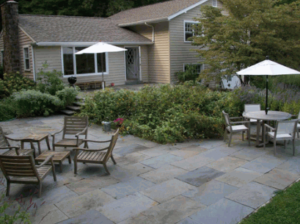
Conclusion
The choice between a resin driveway and block paving depends on a combination of factors, including material preferences, cost considerations, aesthetic appeal, durability requirements, and environmental concerns.
When comparing resin driveways and block paving, it’s essential to evaluate the diverse surface solutions each option offers. Resin driveways, known for their seamless finish and modern look, provide a unique aesthetic appeal. On the other hand, block paving offers a traditional charm with its distinct patterns and textures.
Choosing between the two involves considering the maintenance needs, installation costs, and long-term performance of the materials. Resin driveways are favored for their low maintenance and weed-resistant properties, while block paving allows for easy repairs and individual replacement of blocks.
Ultimately, achieving a balance between practical needs and design aspirations is crucial in making an informed decision that complements the overall aesthetics and functionality of your property.

